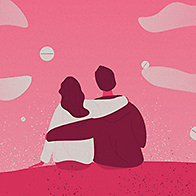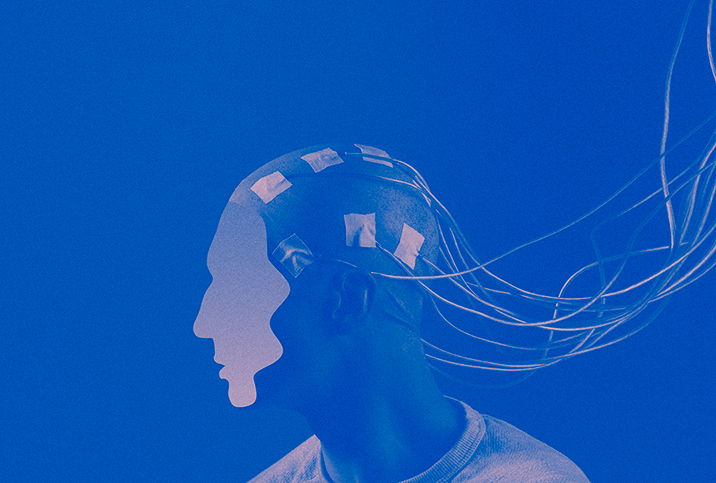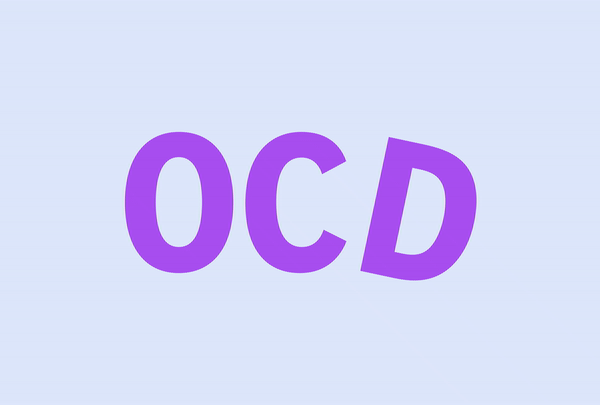Don't Let Relationship OCD Keep You From Loving Others

On a muggy summer night you're wide awake in bed, restlessly listening to the wheezy tones of your partner's snores. Your mind starts to wander and you think to yourself, "Can I sleep next to this freight train for the rest of my life? Is my partner truly the best match for me?"
Fueled by anxieties born from the possibility of becoming stuck in the wrong relationship, you unstick yourself from the sweaty mattress and open your laptop to search for answers. You spend hours reading articles and taking quizzes that purport to help you determine the quality of your relationship, but no search result brings you any closer to clarity. You text a friend, "How do you know when you're with the right person?" (And, of course, they don't reply as it's 3 a.m. and they have more productive things to do—like sleep.)
The uncertainty of your choices hangs heavy in the air, suffocating you more than the heat of the oncoming summer day ever could.
Everyone has questions that arise around the compatibility of their romantic relationship, but when the distress caused by this uncertainty leads you to engage in time-consuming behaviors that feel compulsive, there might be something more serious at play: relationship OCD.
What is relationship OCD?
Washington, D.C., area psychotherapist Stephanie Woodrow describes relationship OCD as a subtype of obsessive-compulsive disorder, "a combination of unwanted, intrusive thoughts and images (obsessions) that are bizarre in nature and trigger feelings of anxiety, disgust or a 'just not right' feeling."
"People attempt to avoid or neutralize these obsessions by engaging in physical or mental behaviors called compulsions. Compulsions offer short-term relief, anywhere from seconds to hours," Woodrow said. "But, inevitably, the obsessions return."
To combat this physical, emotional and mental distress, you engage in compulsive behaviors aimed at gaining certainty about the state of your relationship.
Relationship OCD's obsessive thoughts usually present in two forms, said Maria Jimenez, a clinical psychologist based in Tampa, Florida.
"One form is the focus on some perceived flaw that a partner may have, something as small as a crooked nose or as big as narcissism," she said. "The flaw will become the source of an obsession. The other form is more emotional, asking yourself questions like, 'Is this the right partner? Am I in love enough with them?'"
If you have relationship OCD, there might not be much evidence to support these doubts, but that won't stop them from plaguing you. You may even start to view those doubts as proof the relationship is flawed.
Engaging with these doubts creates anxiety. To combat this physical, emotional and mental distress, you engage in compulsive behaviors aimed at gaining certainty about the state of your relationship. Jimenez said compulsions range from rumination to social comparison to seeking reassurance from your friends, family or partner.
"If you're triggered by a perceived flaw—maybe your partner's crooked nose—you will start looking at other people with different noses, trying to find some evidence of your love for your partner," Jimenez said. "If my obsession is wondering if I'm in love enough, I might compare my relationship with others, read articles about what makes a good relationship and ask my friends, family and partner about my relationship. We engage in this behavior over and over again because no answer is enough. This tends to be impairing because it's significantly time-consuming, hindering you from eating, studying or working."
When should you seek professional help?
Only a trained mental health professional can diagnose you with relationship OCD. They'll base the diagnosis on the amount of time you spend with obsessions and compulsions, and the level of distress they create. Therapists who are trained to treat OCD guide patients through the gold-standard treatment for the disorder: exposure and response prevention (ERP.)
This process involves first identifying your triggers or obsessions, then organizing them into a fear hierarchy or ladder. Your therapist will invite you to start at the first rung of the ladder and expose yourself to the triggers that bring you the least distress, eventually working your way up to the most distressing.
Each trigger is acknowledged and allowed to pass while your therapist encourages you to resist engaging in any compulsions. Some common exposure practices for relationship OCD include "reading, writing or saying certain words or phrases, watching videos about people who stayed in 'wrong' relationships or setting up a profile on a dating app," Woodrow said.
Ultimately, overcoming relationship OCD and entering into or working toward a healthy romantic relationship involves a willingness to love despite the fear and uncertainty
Jimenez suggests acceptance and commitment therapy (ACT) as a treatment method that can help people with relationship OCD develop cognitive flexibility, a skill that allows them to recognize their obsessions without identifying with them, instead placing focus on a set of core values they determine with their therapist.
"Acknowledge and see things as they happen, but stop being in the storm. You are not anger, depression, anxiety or OCD," Jimenez said. "You have the capacity to decide to see it and allow the energy to move through. That may look like telling yourself, 'I am thinking this may not be the right person for me, and I am accepting that this thought exists.'"
With support and bravery, recovery happens
Woodrow explained overcoming relationship OCD involves the support of a loving partner. She encourages any given patient's partner to come in for one-on-one sessions where they can ask her questions and work toward finding healthy ways to support their partner's recovery.
"Most people who are in a relationship with someone with relationship OCD want to understand their partner's struggle and be supportive," she says. "We create a list of phrases they can say when their partner is struggling, like 'I know this is really hard for you, and I'm proud that you're working on it. Can I give you a hug?' This is very different than reassurance, which is unhelpful."
Ultimately, overcoming relationship OCD and entering into or working toward a healthy romantic relationship involves a willingness to love despite the fear and uncertainty. It's a hard pill to swallow, but it helps to accept that everyone lives with the uncertainty of not knowing what love has in store for you next.
"A person with relationship OCD who isn't in a romantic relationship might be afraid to be in one because if they haven't dealt with those doubts, they're likely to come back and that may result in anticipatory anxiety," Jimenez said. "You have to learn to tolerate uncertainty and distress. Doubt is what moves science, creation and invention. Doubt allows new things to happen. So, embrace uncertainty. Be curious."




















